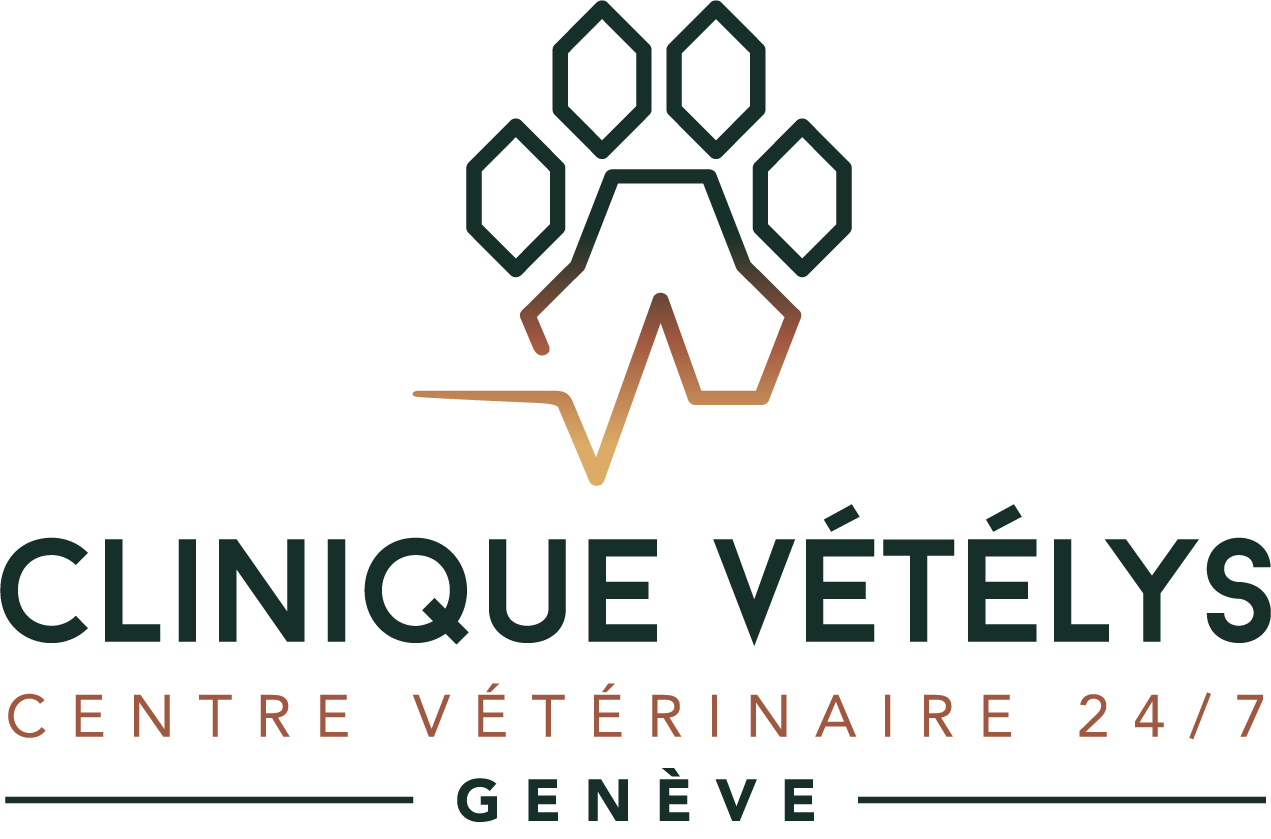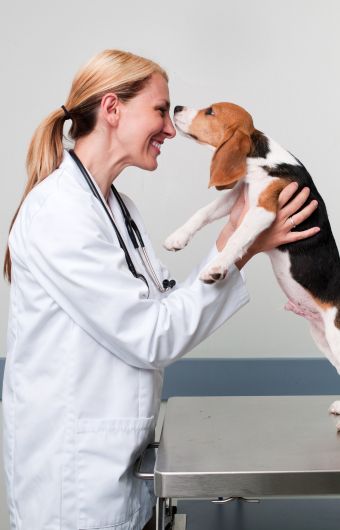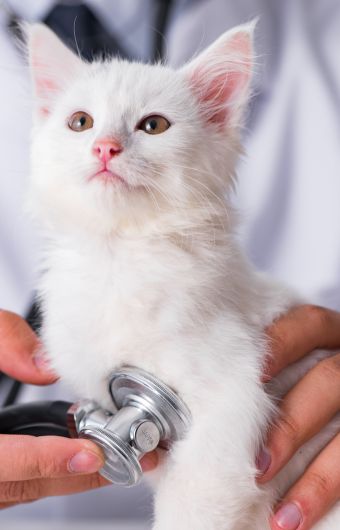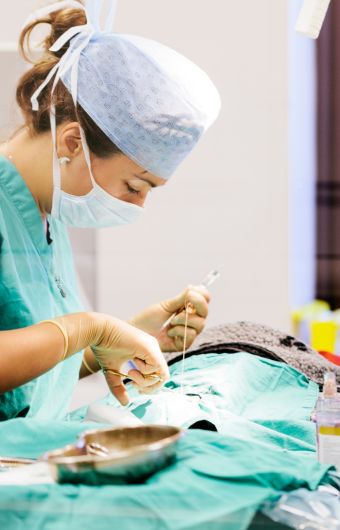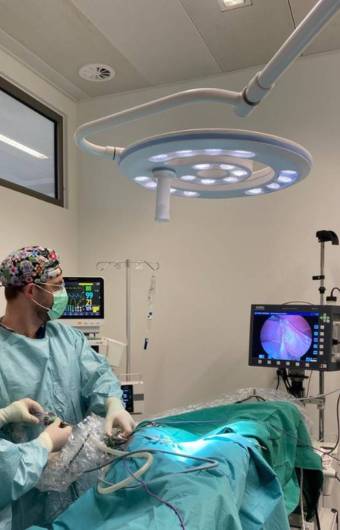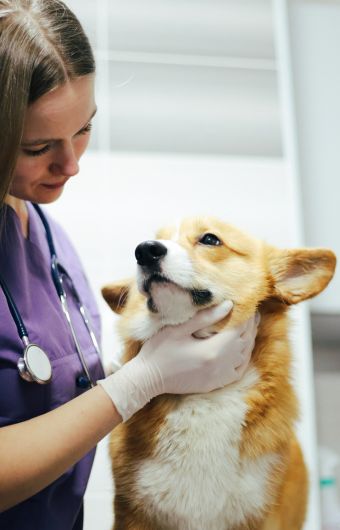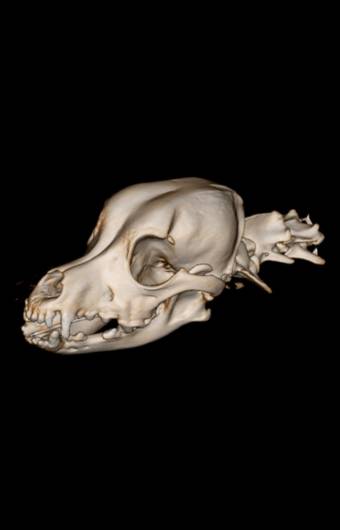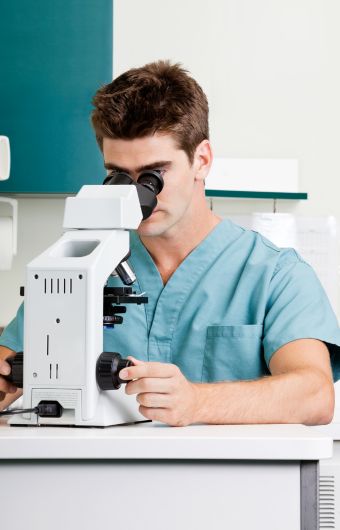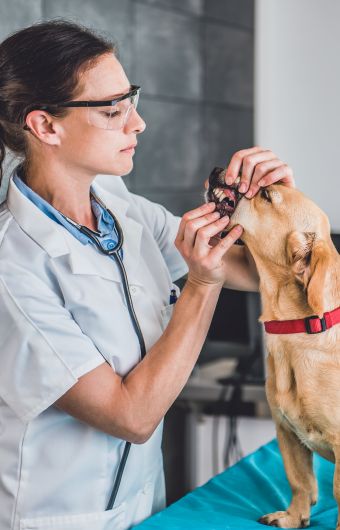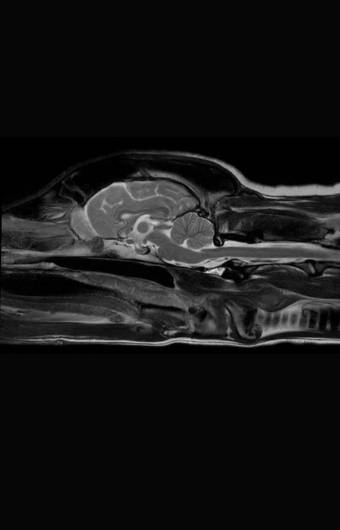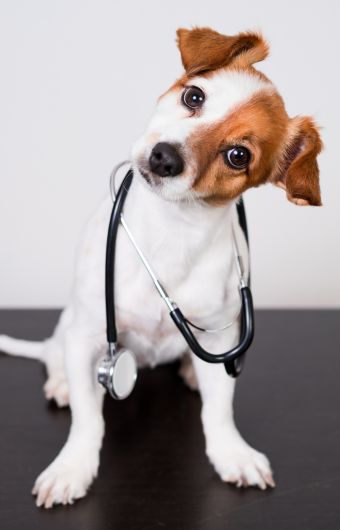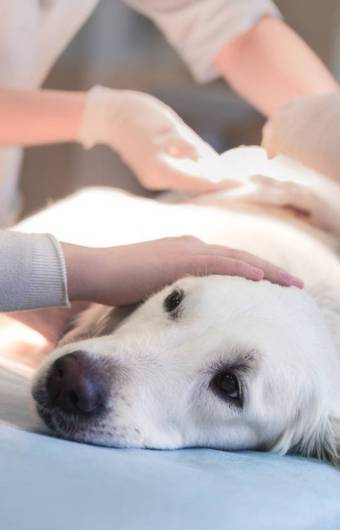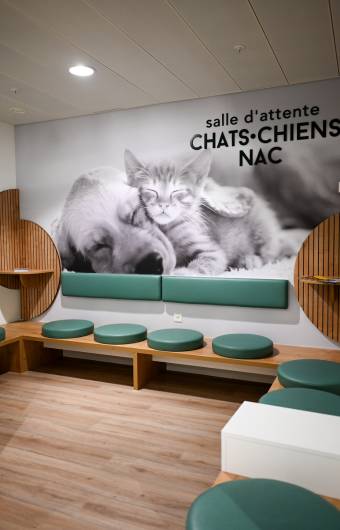Veterinary dentistry services at the Vétélys clinic: tailor-made care in Geneva
Oral health plays a key role in your pet’s well-being. At the Vétélys clinic in Vernier Blandonnet, Geneva, our specialist veterinary nurses and doctors provide comprehensive dental care to prevent, diagnose and treat oral ailments in your pets, whether they are dogs, cats, NACs or other species.
Regular check-ups help prevent complications such as tartar, infections, chronic pain and tooth loss. Our team provides preventive care (scaling, polishing), dental extractions if necessary, and treatment of periodontal disease and other oral conditions (root canal therapy, etc.). Thanks to our state-of-the-art equipment and attentive approach, we can guarantee care tailored to the specific needs of each patient.
Find out more about our veterinary dentistry services below and give your pet a healthy smile.
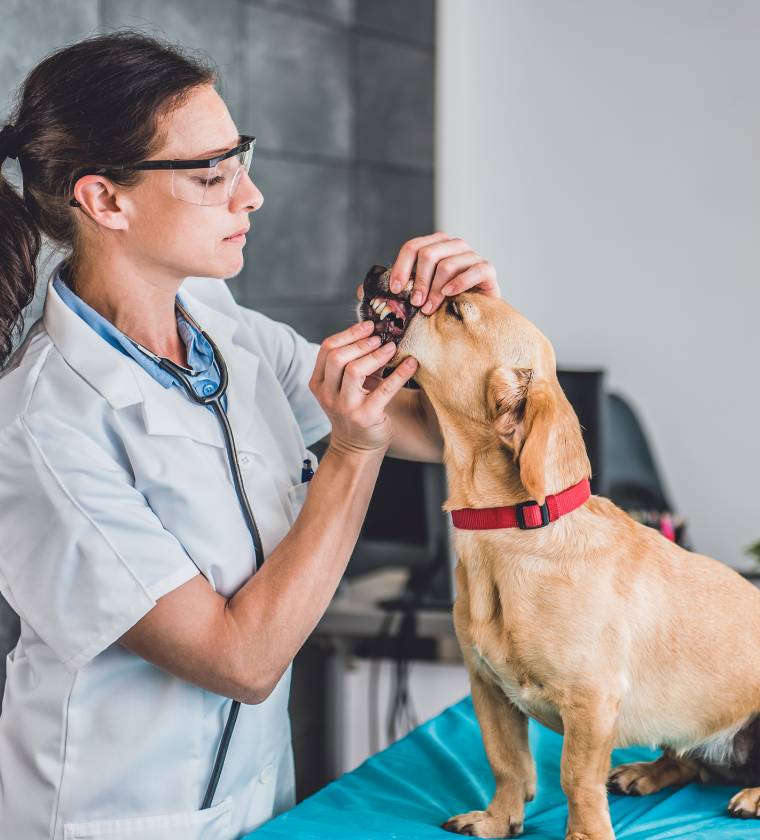
Veterinary dentistry Vernier Geneva
Advanced diagnosis with DCT dental cone beam
The veterinary dentistry department at the Vétélys clinic has an exclusive feature: the dental cone beam, a revolutionary 3D imaging technology that provides exceptionally accurate images in a very short time, significantly reducing the duration of anaesthesia. This imaging test is essential for :
- Identify lesions hidden beneath the gum line, dental fractures, underlying infections, tooth resorption, bone changes, etc.
- Assess maxillofacial trauma
- Meticulously plan complex operations.
- Diagnose congenital anomalies or maxillofacial tumours.
Dental care available:
- Scaling and polishing: removal of tartar and plaque.
- Treatment of periodontal disease: curettage of gum pockets, surgical periodontal treatment.
- Dental extraction: surgical removal of fractured, infected or non-viable teeth. FLAP surgical gingival coverage.
- Treatment of dental fractures: partial biopulpectomy.
- Maxillofacial surgery: management of tumours, malformations or complex fractures.
- Veterinary orthodontics: correction of dental malposition.
- Preventive dental care: regular check-ups, advice on oral hygiene, and implementation of appropriate routines (brushing, specific foods).
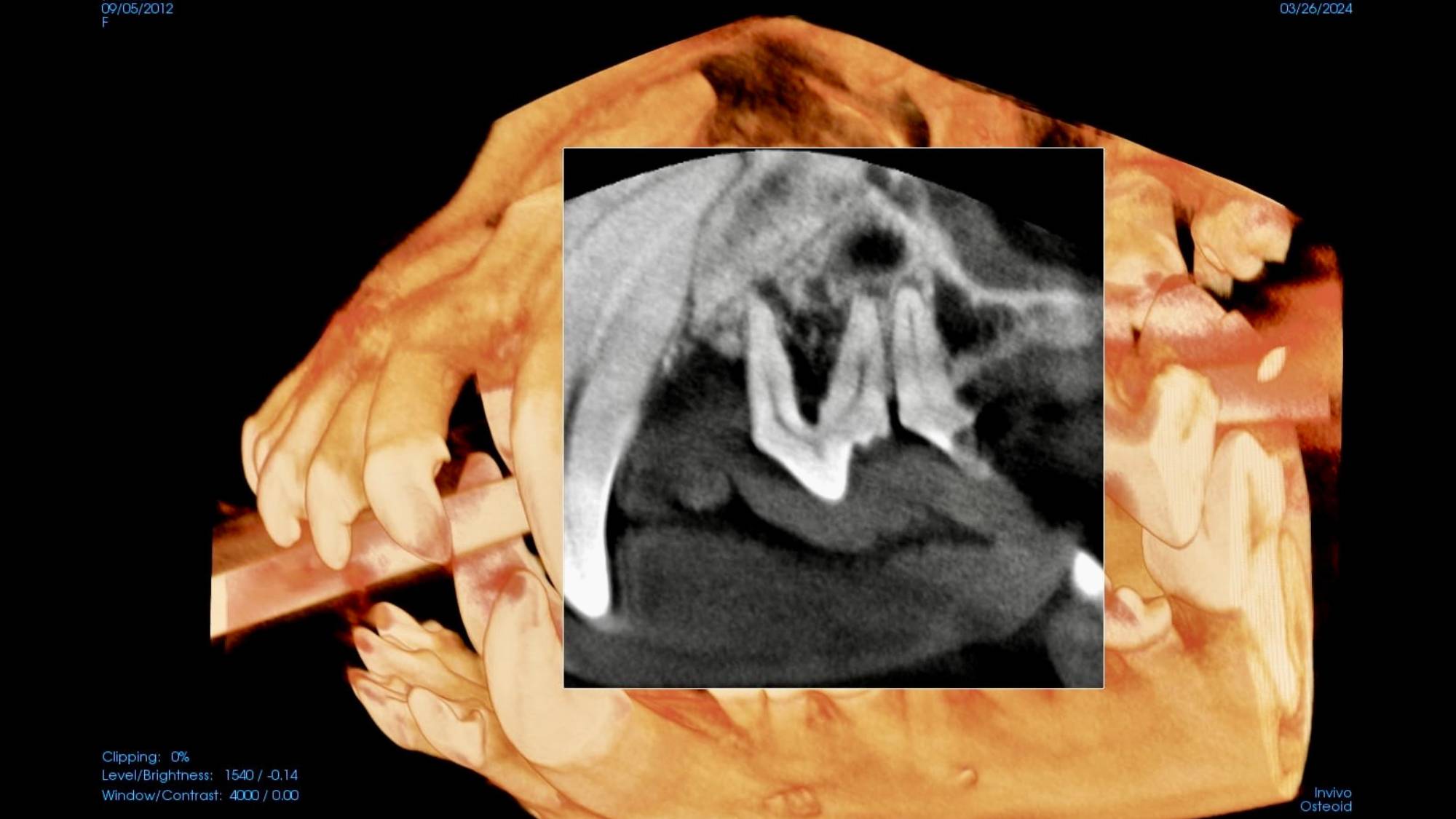
Emergencies 24/7
Veterinary dentistry Vernier Geneva
What happens during a consultation with a veterinary dentist for your your pet in Geneva
A consultation in a veterinary emergency in Geneva takes place in 4 stages: a complete oral and dental examination, advanced imaging with the DCT cone beam, then planning and intervention are planned and finally the final stage consists of post-operative care and the prevention of new pathologies.
Full oral and dental check-up
- Direct observation of the teeth, gums and oral cavity.
- Palpation of the jaws and search for signs of inflammation or pain.
Advanced imaging with DCT cone beam (under sedation or full narcosis)
- 3D visualisation of dental structures, roots and jawbones.
- Precise diagnosis of abnormalities invisible to clinical examination.
- Ultra-fast examination: 2 min image acquisition time
Planification et intervention
- Care protocol adapted according to results.
- Anaesthesia and appropriate anaesthetic monitoring
- Locoregional anaesthesia to optimise analgesia – pain control, combined with IV morphine.
Post-operative care and prevention
- Advice on maintaining good oral hygiene at home.
- Follow-up plan to check healing and prevent new pathologies.
Answers to your questions
Find out more about the Vétélys clinic’s dentistry department
Why is the DCT cone beam a revolution in veterinary dentistry?
The dental cone beam offers high-definition 3D imaging, enabling :
- Perfect visualisation of all dental roots and surrounding bone.
- Faster, more accurate diagnosis, particularly of complex pathologies.
- Ultra-precise surgical planning.
- Significantly reduced examination time compared with traditional dental X-rays, resulting in shorter anaesthesia times.
Does my pet need to be anaesthetised for dental treatment?
Yes, dental treatment requires a general anaesthetic to guarantee the animal’s immobility and comfort. Our protocols are adapted to each individual to minimise the risks.
How can I prevent dental problems in my pet?
- Brush your pet’s teeth twice a day with a suitable toothpaste.
- Use food supplements designed to reduce plaque.
- Plan at least annual dental check-ups for regular maintenance.
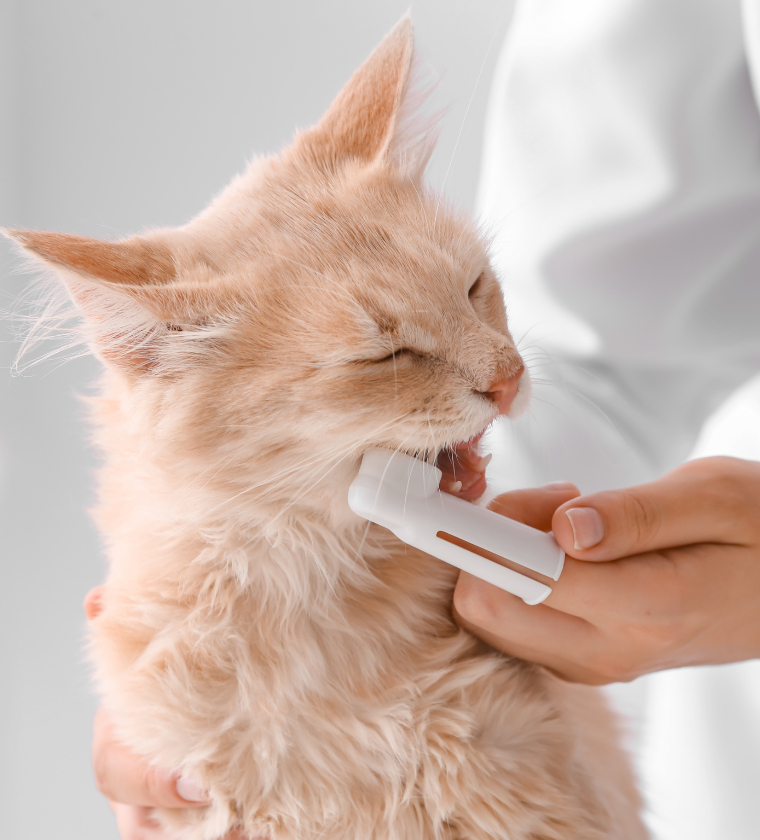
Testimonials
They’ve been to the Vétélys veterinary clinic
A pre-surgery visit elsewhere left me feeling completely insecure! I was very happy to have found this clinic where I felt the love of the animal as soon as I walked through the door; I was able to bring her in on the big day with confidence and without too much added stress! Everything was really perfect (welcome, taking care of the animal AND its human, clear explanations, etc.). Too far from my home to keep them as a regular vet and that’s a shame!
A big THANK YOU to this great team that I recommend with my eyes closed!
Absolutely extraordinary people work here: they really care about the animals and their keepers. They have state-of-the-art equipment, several specialists and they speak English. What I also really appreciated was that they provided us with all the information and called us when they promised. This really helps to minimise your worries. Thank you for saving our cat!
I’m very happy and I’ll be taking my princess to Vétélys with complete confidence. The team is very friendly and very competent. They take great care of our animals and listen to people.
A place equipped with the best for the care of our loves. Open 7 days a week.
My special thanks to Dr Cathénoz.
I highly recommend the Vétélys clinic.
I brought my dog here after being bitten by another dog. They took him in almost immediately and were extremely attentive when treating him. They also took care of filing the report with the SCAV against the dog that bit him. I highly recommend them.
I went to the routine checks and the last moments. The staff are incredibly friendly and knowledgeable. I would recommend this vet.
Impeccable clinic, top-quality, friendly staff!
Experts insights
Tips for good oral health:
- Watch for signs: if your pet refuses to eat hard food, stops eating or has bad breath, consult a dental hygienist as soon as possible.
- Adopt a hygiene routine: brushing is the best form of prevention.
- Invest in specific foods and products: certain dental snacks help to reduce tartar, as do certain food supplements.
La Dresse Méd. Vét. Dahlia Pialat , spécialisée en dentisterie vétérinaire, explique
“Grâce au cone beam, nous sommes capables d’identifier et de traiter des pathologies invisibles avec une précision jamais atteinte auparavant”
Consultations
-
Initial dental consultation: CHF 60
-
Scaling and polishing under anaesthetic: CHF 110 to 300, depending on the difficulty of the case
-
Dental extraction: CHF 120 to 600, depending on the difficulty of the case
-
Dental cone beam imaging: CHF 160 (cats and small dogs), CHF 260 (large dogs)
-
Complex maxillofacial surgery: on request.
A personalised quote is drawn up after assessing your pet’s dental condition.
Clinic specialties
Discover our other specialties
